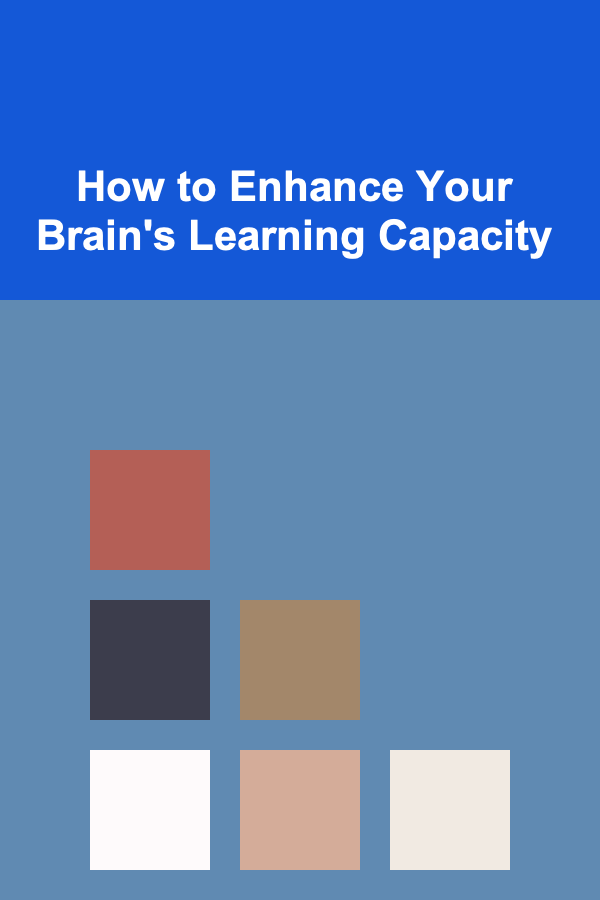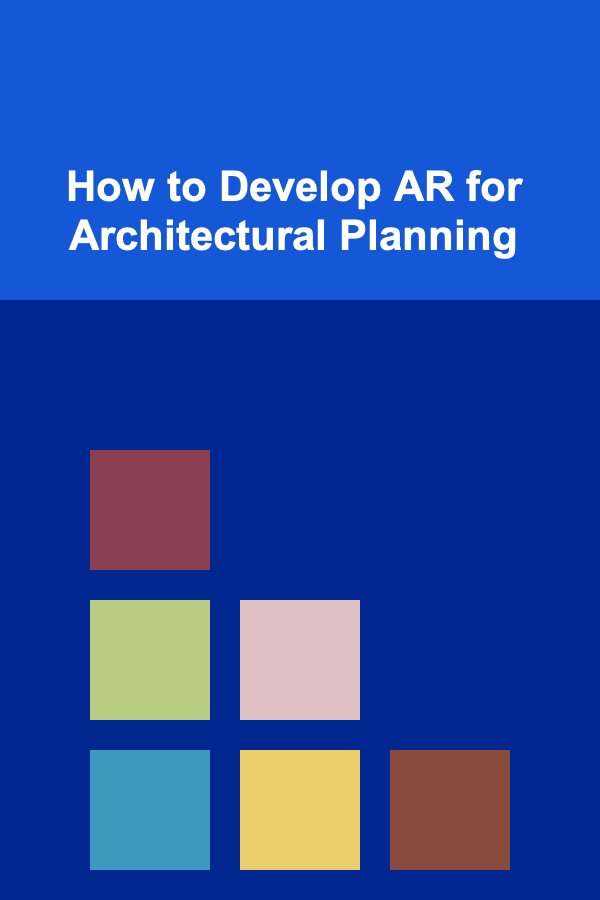
How to Enhance Your Brain's Learning Capacity
ebook include PDF & Audio bundle (Micro Guide)
$12.99$9.99
Limited Time Offer! Order within the next:

The human brain is one of the most powerful and adaptable organs in the body. It has an incredible ability to learn, adapt, and grow throughout our lives, a phenomenon known as neuroplasticity. Whether you are a student, professional, or lifelong learner, enhancing your brain's learning capacity can help you improve memory, critical thinking, problem-solving abilities, and creativity. In this article, we will explore a variety of strategies to help you unlock your brain's potential, backed by scientific research and practical tips.
Understand How the Brain Learns
Before diving into specific strategies for enhancing learning capacity, it's essential to understand how the brain processes and retains information. The brain learns through a process called synaptic plasticity, which refers to the strengthening or weakening of synapses (the connections between neurons) based on experience. When you engage in learning activities, new neural pathways are formed. Repeated learning leads to long-term potentiation (LTP), where the connection between neurons becomes stronger, making it easier for you to recall information in the future.
This learning process is influenced by a variety of factors, including your environment, emotions, attention, and lifestyle. Understanding how learning works is crucial because it enables you to tailor your habits and routines to enhance your brain's capacity.
Adopt Lifelong Learning Habits
The first step in enhancing your brain's learning capacity is adopting a lifelong commitment to learning. Studies have shown that lifelong learners experience improved cognitive function and a reduced risk of cognitive decline as they age. The key is to constantly challenge your brain by engaging in new activities and acquiring new knowledge. Here are some habits to consider:
2.1 Embrace Curiosity
Curiosity is the natural fuel for learning. When you're curious, your brain actively seeks new information and forms new connections. To enhance your learning capacity, cultivate a mindset of curiosity. Ask questions, explore topics you don't know much about, and seek out new experiences. This will not only expand your knowledge but also strengthen your brain's ability to process and retain new information.
2.2 Consistent Practice
Consistency is a vital part of the learning process. Practice, repetition, and active engagement with new material help your brain reinforce connections and improve retention. Whether it's learning a new language, playing a musical instrument, or studying a complex subject, regular practice will help solidify what you've learned. Break down your learning into manageable chunks, and schedule time to review regularly to keep the information fresh in your mind.
2.3 Stay Open to New Challenges
One of the most effective ways to expand your brain's learning capacity is by constantly challenging yourself. When you step outside your comfort zone, your brain works harder to adapt and process new information. Take on tasks that require creative problem-solving, critical thinking, or skill-building. Challenging tasks force the brain to form new neural pathways and strengthen existing ones, improving your overall cognitive abilities.
Optimize Your Environment
Your learning environment plays a critical role in how effectively you absorb and retain information. A conducive learning environment can help you focus, reduce distractions, and stimulate creativity. Here are some strategies to optimize your surroundings for better learning:
3.1 Minimize Distractions
Distractions are one of the biggest obstacles to learning. Whether it's social media, noise, or other environmental factors, distractions can significantly impair your brain's ability to focus and retain information. To enhance your learning capacity, create a quiet, organized, and distraction-free space where you can immerse yourself in the learning process. Use noise-canceling headphones or find a quiet place if necessary.
3.2 Use Visualization Techniques
Visual aids can greatly enhance learning. The brain processes visual information more quickly than text, making visualization techniques a powerful tool for retaining information. Create diagrams, mind maps, or flowcharts to visualize complex concepts. This method not only helps you understand and remember information but also allows you to identify relationships between ideas more clearly.
3.3 Stimulate Your Senses
A multisensory environment can also enhance learning. Engage different senses---such as sight, sound, and touch---to strengthen your brain's ability to process and store information. For example, listen to podcasts while studying, watch instructional videos, or use physical objects to represent abstract concepts. This multisensory approach can activate different parts of the brain, improving learning outcomes.
Improve Your Cognitive Functioning
Cognitive functions such as attention, memory, and processing speed are key to effective learning. Improving these functions can significantly boost your brain's capacity to learn. Here are some strategies for optimizing cognitive functioning:
4.1 Get Enough Sleep
Sleep is crucial for brain health and learning. During sleep, the brain consolidates memories and strengthens the neural connections formed during the day. Lack of sleep impairs cognitive function, making it harder to concentrate, process information, and retain what you've learned. Aim for 7-9 hours of sleep per night to support optimal brain function.
4.2 Exercise Regularly
Physical exercise has a profound impact on brain health. Exercise increases blood flow to the brain, stimulating the growth of new neurons and enhancing cognitive function. Regular physical activity has been shown to improve memory, learning ability, and attention span. Aim for at least 30 minutes of moderate exercise a few times a week to keep your brain in top shape.
4.3 Eat Brain-Boosting Foods
What you eat can significantly impact your brain's performance. Diets rich in antioxidants, omega-3 fatty acids, and vitamins can help protect the brain from oxidative stress and support cognitive function. Include foods like berries, leafy greens, fatty fish, nuts, and seeds in your diet to provide your brain with the nutrients it needs to function optimally.
4.4 Practice Mindfulness and Meditation
Mindfulness and meditation techniques have been shown to improve attention, reduce stress, and enhance learning. These practices help train the brain to focus and become more aware of the present moment. Regular mindfulness practice can increase the brain's ability to process information, reduce mental clutter, and improve cognitive flexibility.
4.5 Engage in Cognitive Training
Just like physical exercise strengthens muscles, cognitive exercises can improve brain function. Engage in activities that challenge your brain, such as puzzles, memory games, and problem-solving tasks. These activities stimulate the brain and improve neural connections, making it easier for you to learn and retain new information.
Leverage Technology for Learning Enhancement
In today's digital age, technology offers numerous tools to enhance learning. From brain training apps to online courses, technology can help you accelerate your learning process. Here are some ways to leverage technology:
5.1 Brain Training Apps
There are various apps designed to improve brain function and cognitive skills. Apps like Lumosity, Peak, and Elevate offer games and exercises that target memory, attention, problem-solving, and language skills. These apps use neuroscience-based techniques to challenge your brain and enhance learning capacity.
5.2 Online Learning Platforms
Online learning platforms like Coursera, edX, and Khan Academy provide access to courses from top universities and institutions around the world. Taking online courses allows you to engage with a wide variety of subjects at your own pace, expanding your knowledge and stimulating your brain's learning capacity.
5.3 Virtual Reality and Augmented Reality
Virtual reality (VR) and augmented reality (AR) technologies offer immersive learning experiences that can enhance engagement and understanding. These technologies allow you to interact with 3D models, simulations, and real-world environments in ways that traditional learning methods cannot. VR and AR can be particularly effective for learning complex subjects, such as anatomy, engineering, and architecture.
Enhance Your Emotional and Social Intelligence
Emotional and social intelligence also play a significant role in learning. Emotional regulation, empathy, and communication skills can enhance your ability to absorb and retain information in social and emotional contexts. Here's how you can improve these aspects:
6.1 Practice Emotional Regulation
Emotions can both hinder and enhance learning. Stress, anxiety, and frustration can impair your cognitive abilities, making it harder to focus and retain information. Learning how to manage your emotions through techniques like deep breathing, journaling, and relaxation exercises can improve your mental clarity and learning capacity.
6.2 Develop Empathy and Social Connections
Learning is often more effective when done in a social context. Working with others, sharing ideas, and engaging in discussions can enhance your understanding of concepts and deepen your knowledge. Building strong social connections and practicing empathy can create a supportive learning environment that encourages growth and knowledge sharing.
Conclusion
Enhancing your brain's learning capacity is not a one-time effort but a lifelong journey. By adopting effective learning habits, optimizing your environment, improving your cognitive functions, leveraging technology, and focusing on emotional and social intelligence, you can unlock your brain's full potential. Embrace the idea of continuous growth and exploration, and remember that learning is an ongoing process that enhances not only your knowledge but also your cognitive and personal development.

How to Organize a Kid's Playroom with Clever Furniture Choices
Read More
Smart Strategies for Utilizing Customer Rewards Programs to Boost Your Benefits
Read More
The Power of Informational Interviews: How to Conduct Them
Read More
How to Develop AR for Architectural Planning
Read More
How to Negotiate a Better 401(k) Match with Your Employer
Read More
10 Tips for Mastering Short Game in Windy Conditions
Read MoreOther Products

How to Organize a Kid's Playroom with Clever Furniture Choices
Read More
Smart Strategies for Utilizing Customer Rewards Programs to Boost Your Benefits
Read More
The Power of Informational Interviews: How to Conduct Them
Read More
How to Develop AR for Architectural Planning
Read More
How to Negotiate a Better 401(k) Match with Your Employer
Read More